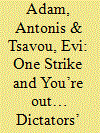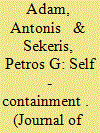| Srl | Item |
| 1 |
ID:
185493


|
|
|
|
|
| Summary/Abstract |
We use a cross-country dataset on terrorism and leadership survival from 1970 through 2015 to shed light on a leader’s fate after terrorists’ strike. We provide robust evidence that incumbents in electoral authoritarian regimes face an increased hazard of exit from political power. This is contrasted with the closed authoritarian dictators that remain intact. Moreover, we fail to find a robust effect of terrorism on a leader’s survival probability in democracies. We conceive this effect to be due to the collapse of the elite coalition in autocracies after an attack, suggesting that the dictator’s ‘loyal friends’ betray him in the aftermath of terrorism.
|
|
|
|
|
|
|
|
|
|
|
|
|
|
|
|
| 2 |
ID:
150995


|
|
|
|
|
| Summary/Abstract |
In anarchic settings, potential rivals can be dragged into arms races degenerating in open wars out of mutual suspicion. We propose a novel commitment device for contestants to avoid both arming and fighting. We assume that the military decides the armament levels of a country, while the civilian decides whether to attack a rival country. When these decision-making bodies perfectly communicate, the decision makers are unable to credibly communicate to their foe their willingness not to arm and not to attack, thus implying that war ensues. With imperfect information, however, peace may ensue as countries credibly signal to their rival a more peaceful stance since contestants are more reluctant to enter in an armed confrontation with a potentially understaffed army. Using data on the 1975 to 2001 period, we provide supportive evidence that in countries where the head of the state or the defense minister are military officers, and are therefore better informed of their armies’ fighting preparedness, the likelihood of observing an international conflict is higher.
|
|
|
|
|
|
|
|
|
|
|
|
|
|
|
|